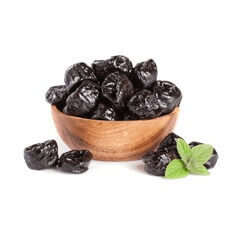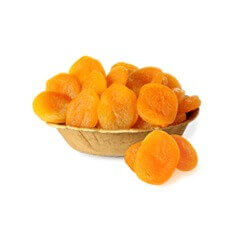The Nutritious and Versatile World of Dry Fruits
Dry fruits are a popular and nutritious snack that has been enjoyed for thousands of years. Dry fruits are made by removing the moisture from fresh fruits through a drying process, which preserves their nutritional content and extends their shelf life. Dry fruits come in various shapes, sizes, and flavors, and are enjoyed worldwide for their health benefits and delicious taste. They are packed with nutrients, including fiber, vitamins, minerals, and healthy fats, making them a great addition to a healthy diet. Some of the most popular types of dry fruits include almonds, cashews, pistachios, dates, raisins, apricots, and prunes. Each dry fruit type has its unique nutritional profile and can provide a range of health benefits, from improving heart health to aiding in weight loss. Dry fruits are a convenient snack that can be enjoyed on the go or added to a variety of dishes, including oatmeal, trail mix, salads, and baked goods. They can also be used as a natural sweetener in recipes, making them a great alternative to processed sugars.
Almonds
Almonds are one of the most popular and nutritious nuts in the world. They are packed with nutrients, including protein, healthy fats, fiber, vitamins, and minerals. In this blog, we’ll explore the health benefits of almonds, as well as ways to incorporate them into your diet.
Health Benefits of Almonds
Good for heart health:
Almonds are rich in monounsaturated and polyunsaturated fats, which can help reduce bad cholesterol levels in the blood. They are also a good source of antioxidants and vitamin E, which can help prevent heart disease.
Boost brain function:
Almonds contain riboflavin and L-carnitine, important brain function nutrients. They also contain magnesium, which is important for nerve function and can help improve memory and cognitive function.
Aid in weight loss:
Almonds are a good source of protein and fiber, which can help you feel full and reduce your overall calorie intake. They are also low in carbohydrates, making them a great snack option for people trying to lose weight.
Regulate blood sugar:
Almonds are low in carbohydrates and high in healthy fats and fiber, which can help regulate blood sugar levels. This makes them a good snack option for people with diabetes.
Good for bone health:
Almonds are a good source of calcium, magnesium, and phosphorus, which are important minerals for bone health. Regular consumption of almonds can help prevent osteoporosis.
Ways to Incorporate Almonds into Your Diet
As a snack:
Almonds are a great snack option and can be enjoyed roasted, raw, or flavored. You can also add them to trail mix or make your own nut butter for a healthy and satisfying snack.
In smoothies and shakes:
Almonds can be blended into smoothies and shake for a nutrient-rich boost. They add a creamy texture and can help keep you full for longer.
In baked goods:
Almond flour can be used as a gluten-free alternative to wheat flour in baked goods such as bread, muffins, and cookies. It adds a nutty flavor and a boost of nutrients.
As a topping:
Almonds can be chopped and added as a topping to yogurt, oatmeal, salads, and other dishes for added texture and flavor. Overall, almonds are a nutritious and versatile food that can be incorporated into a variety of dishes and snacks. Regular consumption of almonds can provide a range of health benefits, making them a great addition to a healthy diet.
Cashews
Cashews are a popular and nutritious nut that is enjoyed around the world for their delicious taste and health benefits. They are native to Brazil but are now widely cultivated in countries such as India, Vietnam, and Tanzania. In this blog, we’ll explore the health benefits of cashews and ways to incorporate them into your diet.

Health Benefits of Cashews
Good for heart health:
Cashews are rich in monounsaturated and polyunsaturated fats, which can help reduce bad cholesterol levels in the blood. They are also a good source of antioxidants and magnesium, which can help lower blood pressure and reduce the risk of heart disease.
Aid in weight loss:
Cashews are a good source of protein and fiber, which can help you feel full and reduce your overall calorie intake. They are also low in carbohydrates, making them a great snack option for people trying to lose weight.
Boost immune system:
Cashews are a good source of zinc, which is important for immune system function. Zinc can help boost the immune system and reduce the risk of infections and diseases.
Good for bone health:
Cashews are a good source of calcium, magnesium, and phosphorus, which are important minerals for bone health. Regular consumption of cashews can help prevent osteoporosis.
Help prevent gallstones:
Regular consumption of cashews has been linked to a reduced risk of gallstones. This is because cashews contain healthy fats that can help prevent the buildup of bile in the gallbladder.
Ways to Incorporate Cashews into Your Diet
As a snack:
Cashews are a great snack option and can be enjoyed roasted, raw, or flavored. You can also add them to trail mix or make your own nut butter for a healthy and satisfying snack.
In smoothies and shakes:
Cashews can be blended into smoothies and shakes for a nutrient-rich boost. They add a creamy texture and can help keep you full for longer.
In baked goods:
Cashew flour can be used as a gluten-free alternative to wheat flour in baked goods such as bread, muffins, and cookies. It adds a nutty flavor and a boost of nutrients.
As a topping:
Cashews can be chopped and added as a topping to yogurt, oatmeal, salads, and other dishes for added texture and flavor. Cashews are a nutritious and versatile food that can be incorporated into a variety of dishes and snacks. Regular consumption of cashews can provide a range of health benefits, making them a great addition to a healthy diet.
Pistachios
Pistachios are a type of nut that has been consumed for thousands of years, particularly in the Middle East and Mediterranean regions. They are known for their distinct taste, texture, and nutritional benefits. In this blog, we will discuss the various features of pistachios, including their nutritional content, health benefits, culinary uses, and storage.
Nutritional Content:
They are low in saturated fats and high in monounsaturated and polyunsaturated fats, which are beneficial for heart health. One ounce (28 grams) of pistachios contains the following nutrients:
Calories: 159
Protein: 6 grams
Carbohydrates: 8 grams
Fiber: 3 grams
Fat: 13 grams (including 7 grams of monounsaturated and 4 grams of polyunsaturated fats)
Vitamin B6: 24% of the daily recommended intake
Thiamine: 16% of the daily recommended intake
Phosphorus: 14% of the daily recommended intake
Copper: 18% of the daily recommended intake
Health Benefits:
Heart Health:
Pistachios are rich in antioxidants, which help reduce oxidative stress and inflammation in the body. They are also a good source of fiber, which can lower cholesterol levels and reduce the risk of heart disease.
Weight Management:
Pistachios are a low-calorie and nutrient-dense food, which makes them a great snack for weight management. They are also high in protein and fiber, which can help you feel fuller for longer.
Blood Sugar Control: Blood Sugar Control:
Pistachios don’t produce a sharp rise in blood sugar levels because they have a low glycemic index. Additionally, they have healthy fats and fibre that can help control blood sugar levels.
Gut Health:
Pistachios are a good source of fibre, which can aid in fostering the development of probiotic bacteria in the gut. This can enhance gut health and digestion in general.
Culinary Uses:
Pistachios can be used in a variety of culinary dishes, including desserts, salads, and main courses. Here are some ideas:
Desserts:
Pistachios are commonly used in desserts such as baklava, ice cream, and cakes.
Salads:
Pistachios can add crunch and flavor to salads. Try adding them to a mixed greens salad or a fruit salad.
Main Courses:
Pistachios can be used as a crust for fish or chicken, or added to pasta dishes for added texture and flavor.
Storage:
Pistachios can be stored in an airtight container at room temperature for up to three months. For a longer shelf life, they can also be kept in the freezer or refrigerator. It is important to store pistachios in a cool, dry place to prevent spoilage. They offer numerous health benefits and are a great addition to a healthy diet. Whether you eat them as a snack or incorporate them into your meals, pistachios are a tasty and healthy choice.
Raisins
Raisins are a type of dried grape that has been enjoyed for centuries. They are sweet, and chewy, and have a distinct flavor that makes them a popular snack and ingredient in a variety of dishes. In this blog, we will discuss the features of raisins, including their nutritional content, health benefits, culinary uses, and storage.
Nutritional Content:
Raisins are a good source of vitamins, minerals, and fiber. They are high in natural sugars and calories but are also low in fat and sodium. One cup (165 grams) of raisins contains the following nutrients:
Calories: 434
Carbohydrates: 115 grams
Fiber: 6 grams
Protein: 4 grams
Vitamin C: 3% of the daily recommended intake
Vitamin K: 4% of the daily recommended intake
Iron: 10% of the daily recommended intake
Potassium: 24% of the daily recommended intake
Health Benefits:
Digestive Health:
Raisins are high in fiber, which can help promote regularity and prevent constipation. They also contain natural laxatives, such as sorbitol and dihydrophenylisatin, which can help alleviate constipation.
Bone Health:
Boron helps the body absorb and utilize calcium, which can improve bone density and reduce the risk of osteoporosis.
Blood Pressure Control:
Raisins contain potassium, which can help lower blood pressure levels. Potassium helps regulate fluid balance in the body, which can reduce the strain on the cardiovascular system.
Antioxidant Properties:
Raisins are high in antioxidants, which can help protect the body against oxidative stress and inflammation. Antioxidants help neutralize free radicals, which can damage cells and contribute to chronic diseases.
Culinary Uses:
A versatile food item, raisins can be utilized in both sweet and savory cuisines. Here are some ideas:
Baking:
Raisins are a popular ingredient in baked goods such as bread, cookies, and cakes.
Salads:
Try adding them to a spinach salad with walnuts and goat cheese.
Trail Mix:
Raisins are a common ingredient in trail mix, which can be a healthy and satisfying snack.
Chutneys and Sauces:
Raisins can be used in chutneys and sauces to add sweetness and complexity of flavor. Try adding them to a mango chutney or a tomato sauce.
Storage:
Raisins can be stored in an airtight container at room temperature for up to six months. They can also be stored in the refrigerator for longer shelf life. It is important to store raisins in a cool, dry place to prevent spoilage. Raisins are a nutritious and versatile food that can be enjoyed in a variety of ways. They offer numerous health benefits and are a great addition to a healthy diet. Whether you eat them as a snack or incorporate them into your meals, raisins are a tasty and healthy choice.
Crux
Dry fruits are a nutritious and delicious food group that offers numerous health benefits. They are a rich source of vitamins, minerals, and antioxidants, and can help improve digestion, boost immunity, and support heart health. Dry fruits are also versatile and can be enjoyed in a variety of ways, from snacking to baking to cooking. Some popular dry fruits include almonds, cashews, pistachios, raisins, and dates, each with its unique flavor and nutritional profile. However, it is important to consume dry fruits in moderation, as they are high in calories and natural sugars. By incorporating a variety of dry fruits into your diet and eating them in moderation, you can enjoy their many health benefits while satisfying your sweet tooth.
To buy wonderful basmati rice, nuts, seeds, and dried fruit, go to the ADNOOR website. For more than twenty-five years, we have been importers, exporters, distributors, vendors, and co-packers of a variety of nuts and grains in Canada. More information is available on our website.
What are dry fruits?
Dry fruits are fruits that have had their water content removed through drying, either naturally or through artificial means. They can be used as a healthy snack or as an ingredient in cooking and baking.
What are the health benefits of dry fruits?
They can help improve digestion, boost immunity, and support heart health. They are also high in fiber and natural sugars, which can help regulate blood sugar levels.
What are some popular types of dry fruits?
Some popular types of dry fruits include almonds, cashews, pistachios, raisins, apricots, dates, figs, prunes, and cranberries.
How should dry fruits be consumed?
Dry fruits can be consumed as a snack, added to trail mixes, used as a topping for oatmeal or yogurt, or incorporated into baked goods and cooking. They can also be blended into smoothies or ground into a paste to make nut butter.
Are there any precautions to take when consuming dry fruits?
Dry fruits are high in calories and natural sugars, so it is important to consume them in moderation. Those with nut allergies should also be cautious when consuming dry fruits, as many of them are derived from nuts.
What are Almonds?
Almonds are a kind of tree nut that grows on the Prunus dulcis tree. They are native to the Middle East and are commonly grown in Mediterranean climate locations such as California, Spain, Italy, and Australia. Almonds have a hard-outer shell that protects the edible seed, often known as the almond nut.
What are the Nutritional Benefits of Almonds?
Almonds are an excellent source of healthy fats, protein, fibre, vitamins, and minerals. They include a lot of vitamin E, magnesium, and calcium. Almonds have been linked to a variety of health advantages, including improved heart health, brain function, weight loss, and skin health. Because of their nutritious richness and possible health advantages, they are frequently included in a healthy diet.
What are Cashews?
Cashews are tree nuts that grow on the cashew tree (Anacardium occidentale). Although the cashew tree originated in Brazil, it is currently produced in many tropical locations across the world, including India, Vietnam, Nigeria, and Indonesia. Cashews are the only nut with a “double shell”: an exterior hard shell and an interior shell containing the edible cashew seed. The cashew seed, often known as the cashew nut, is kidney-shaped and has a rich, creamy flavor with a somewhat sweet flavor.
What are the Nutritional Benefits of Cashews?
Cashews are high in beneficial fats, protein, fibre, vitamins, and minerals. They are high in monounsaturated fats, which are considered heart-healthy fats, and they are also high in antioxidants like vitamin E. Cashews are high in minerals including magnesium, phosphorus, and zinc. They have been linked to a variety of health advantages, including heart health, weight loss, bone health, and skin health. However, because cashews are high in calories, they should be used in moderation as part of a healthy diet.







